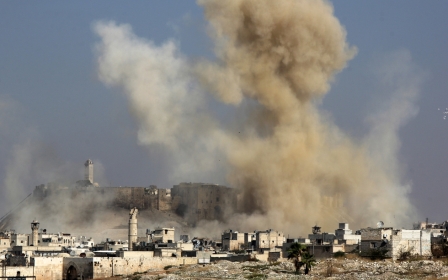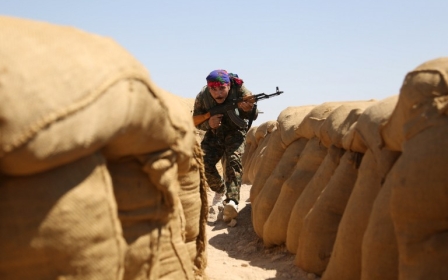Syria's forgotten war: The silent slaughter of Deir Ezzor

Civilians in the besieged eastern province of Deir Ezzor face a humanitarian disaster "much worse than the world imagines" as they grapple with a double siege from the Islamic State (IS) group on one side, and the Syrian army and bombing from Russian and US-led coalition jets on the other.
Omar Abu Lila, a journalist who operates the news website Deir Ezzor 24 from Germany, told MEE on Wednesday that “the situation in Deir Ezzor is going from bad to worse, and there is no media coverage.
“Russia and the Syrian regime are continuing to bomb densely populated civilian areas of the city and the countryside surrounding it to the east and west,” he said.
Despite heavy bombing in recent weeks, activists and residents say that their suffering is being overshadowed by events elsewhere with Syrian government troops, flanked by Russian bombing, making fierce drives against rebel forces in Aleppo, and Kurdish forces advancing near the border with Turkey. Reports of mass starvation in the besieged areas of Madaya and Douma have also dominated headlines.
“The humanitarian situation [in Deir Ezzor] is much worse than the world imagines,” said Abu Lila, adding that residents did not have enough money to buy the necessities “for even a basic life”.
“The Syrian regime is distributing aid to families in al-Joura and al-Qusur [eastern districts that are held by the government], but it is far from enough,” Abu Lila said.
An estimated 200,000 people in Deir Ezzor city are thought to be under a "double siege," according to the advocacy group The Syria Campaign, with the government denying humanitarian groups access to areas inside the city, while IS controls the areas around the city.
Jalal, a member of Justice for Life, a Deir Ezzor-based NGO, reportedly told the Syrian Campaign that the situation was getting desperate.
"We don't know if aid will ever reach us," Jalal said. "And it is always too little."
According to reports, starvation has already set in, with children reportedly dying of hunger or being reduced to "skin and bone".
Shopkeeper Abul Qasim, who was interviewed on the Syria border after claiming to have fled from the city, said that the local hospital was "full of children suffering from hunger".
"All of the children inside the siege at Deir Ezzor are malnourished. Many have diarrhoea, malabsorption and other diseases due to hunger," he said.
The violence and the presence of IS in the region has led to the creation of an activist group calling itself Deir Ezzor is Being Slaughtered Silently, which takes its name from a group set up in Raqqa, the de facto IS capital, which catalogues the abuses and crimes committed by IS members.
Translation: The price of one loaf of bread in al-Jour and al-Qusour reached 100 Syrian Lira today. Most of the bakeries have stopped working - there is now only one in operation and it has been allocated to bake bread for Assad's forces
Translation: Countryside to the east of Deir Ezzor: Islamic State carries out a wave of arrests in al-Jineina village, detaining a number of civilians on suspicion of smuggling food to besieged neighbourhoods
Flashpoint city
Deir Ezzor, a strategic area rich with oil, has changed hands several times during the Syrian war. The IS group has controlled many areas for more than a year, but has found itself under attack for months by a resurgent Syrian army that operates from a nearby military airport and has been desperate to retain one of its only toeholds in the east.
IS led a major offensive on Deir Ezzor city on 16 January, abducting at least 400 civilians, killing at least 120 government soldiers and capturing territory.
So far, said Abu Lila, IS has managed to keep control of areas seized in January in the countryside to the east of Deir Ezzor and Bogeleyyah and some surrounding areas, but the Russians appear to be stepping up their involvement.
In the weeks since the assault, several rounds of Russian air strikes have reportedly targeted different parts of the province as Syria’s government pushes to retake the captured area.
On Monday, more than 100 IS fighters were reportedly killed in attacks by the Syrian army in the province, according to ARA News, an agency focused on Syria and Kurdish news.
In the past few days, leaflets from US-led anti-IS coalition planes have been dropped in al-Bukamal, a city in east of Deir Ezzor province, warning residents to stay away from areas where IS militants gather.
“Coalition forces do not target civilians. Coalition forces only target IS. Do not gather in places where IS are based in order to protect your lives,” a leaflet, which circulated on Twitter and which MEE could not independently verify, read.
The US said that it conducted two attacks in the Deir Ezzor on 17 February, which "cratered a road" used by IS.
Abu Lila, the journalist originally from Deir Ezzor, told MEE that though coalition forces attempted to target IS areas, they struggled to distinguish between IS and civilian sites.
"It is very difficult to tell the difference between IS fighters and civilians. The coalition's air strikes do target IS sites, but these sites have often been completely evacuated by IS fighters. The fighters are mostly now spread out across civilian areas."
Many residents of al-Bukamal are said to have fled previously from attacks on other areas such as Aleppo, some 400 kilometres to the north-east.
On Tuesday, the UN announced that the Syrian government had agreed to give access to aid workers to Deir Ezzor, but it was not immediately clear on Wednesday whether convoys had set out for the town more than 200km from Damascus.
"We are being told that next week Syrian Arab Red Crescent will distribute the aid they received last week," Jalal from Justice for Life was quoted as saying.
Ali, another Deir Ezzor resident who reportedly spoke to the Syrian Campaign, said the Russians were dropping aid into areas sympathetic to the government.
"The food baskets we've received are a drop in the ocean," he was quoted as saying. "It is better to deliver by trucks and not air because the aid just falls into regime hands."
On Wednesday, the Russians also vowed to deliver daily food drops to the area, Syrian state media reported.
But fears are high that this will prove to be too little too late.
Abu Zufrian, a resident, told the Daily Mail that people were eating herbs and roots and domestic animals to stay alive.
One resident, Abdullah, 28, a student who was still inside the city, said that many people were praying for death because they could not face watching their children go hungry.
"This is the worst time of my life living under this siege," he told MailOnline. "The frustration eats away at our bodies as much as the hunger."
Stay informed with MEE's newsletters
Sign up to get the latest alerts, insights and analysis, starting with Turkey Unpacked
Middle East Eye delivers independent and unrivalled coverage and analysis of the Middle East, North Africa and beyond. To learn more about republishing this content and the associated fees, please fill out this form. More about MEE can be found here.





